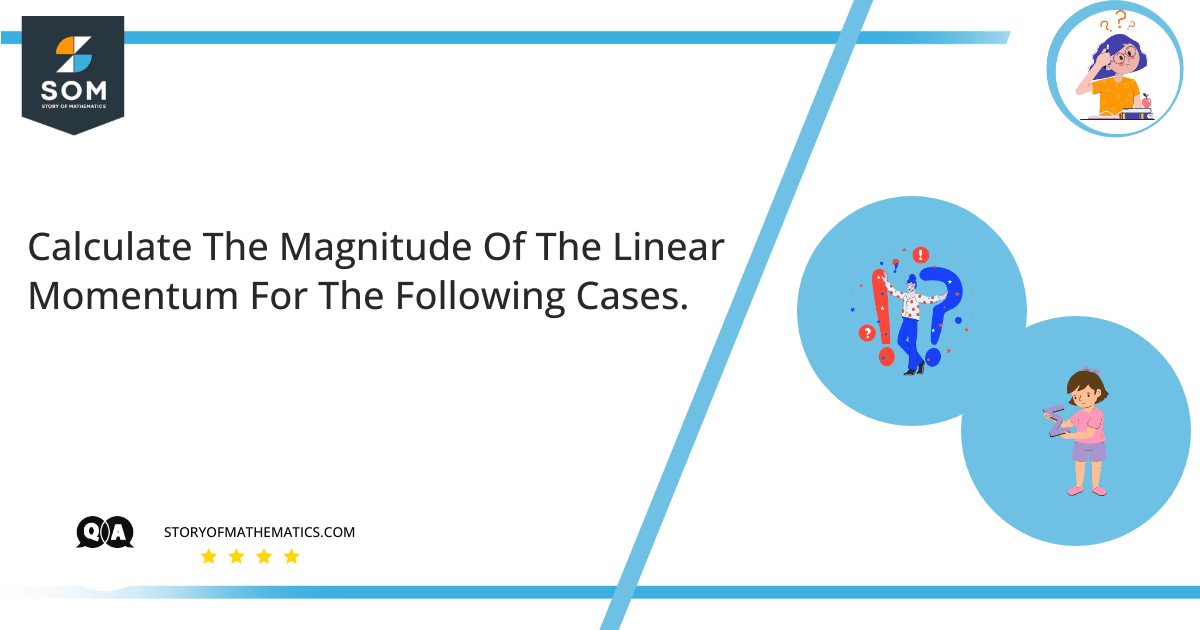
- A proton with mass 1.67X10^(-27) kg, moving with a speed 5X10^(6) m/s.
- A 15.0g bullet moving with a speed of 300m/s.
- A 75.0 kg sprinter running with a speed of 10.0 m/s.
- Earth (mass = 5.98X10^(24) kg) moving with an orbital speed equal to 2.98X10^(4) m/s.
The aim of this question is to learn the calculations involved in determining the linear momentum of a moving object.
The linear momentum of an object of mass m kilogram moving with a linear speed of v meters per second is defined as the product of mass m and the speed v. Mathematically:
\[ P \ = \ m v \]
Expert Answer
Part (a): A proton with mass $ 1.67 \times 10^{ -27 } \ kg $, moving with a speed of $ 5 \times 10^{ 6 } \ m/s $.
Here:
\[ m \ = \ 1.67 \times 10^{ -27 } \ kg \]
And:
\[ v \ = \ 5 \times 10^{ 6 } \ m/s \]
So:
\[ P \ = \ m v \]
\[ \Rightarrow P \ = \ ( 1.67 \times 10^{ -27 } \ kg )( 5 \times 10^{ 6 } \ m/s ) \]
\[ \Rightarrow P \ = \ 8.35 \times 10^{ -21 } \ kg \ m/s\]
Part (b): A $ 15.0 \ g $ bullet moving with a speed of $ 300 \ m/s $.
Here:
\[ m \ = \ 0.015 \ kg \]
And:
\[ v \ = \ 300 \ m/s \]
So:
\[ P \ = \ m v \]
\[ \Rightarrow P \ = \ (0.015 \ kg )( 300 \ m/s ) \]
\[ \Rightarrow P \ = \ 4.5 \ kg \ m/s\]
Part (c): A $ 75.0 $ $ kg $ sprinter running with a speed of $ 10.0 $ $ m/s $.
Here:
\[ m \ = \ 75.0 \ kg \]
And:
\[ v \ = \ 10.0 \ m/s \]
So:
\[ P \ = \ m v \]
\[ \Rightarrow P \ = \ (75.0 \ kg )( 10.0 \ m/s ) \]
\[ \Rightarrow P \ = \ 750.0 \ kg \ m/s\]
Part (d): Earth $ ( \ mass \ = \ 5.98 \times 10^{24} \ kg \ ) $ moving with an orbital speed equal to $ 2.98 \times 10^{4} \ m/s $.
Here:
\[ m \ = \ 5.98 \times 10^{24}\ kg \]
And:
\[ v \ = \ 2.98 \times 10^{4} \ m/s \]
So:
\[ P \ = \ m v \]
\[ \Rightarrow P \ = \ ( 5.98 \times 10^{24} \ kg )( 2.98 \times 10^{4} \ m/s ) \]
\[ \Rightarrow P \ = \ 1.78 \times 10^{29} \ kg \ m/s\]
Numerical Result
\[ \text{Part (a): } P \ = \ 8.35 \times 10^{ -21 } \ kg \ m/s\]
\[ \text{Part (b): } P \ = \ 4.5 \ kg \ m/s\]
\[ \text{Part (c): } P \ = \ 750.0 \ kg \ m/s\]
\[ \text{Part (d): } P \ = \ 1.78 \times 10^{29} \ kg \ m/s\]
Example
Calculate the magnitude of the linear momentum for an object of mass $ 5 \ kg $ moving with a speed of $ 80 \ m/s $.
Here:
\[ m \ = \ 5 \ kg \]
And:
\[ v \ = \ 80 \ m/s \]
So:
\[ P \ = \ m v \]
\[ \Rightarrow P \ = \ (5 \ kg )( 80 \ m/s ) \ = \ 400 \ kg \ m/s\]
